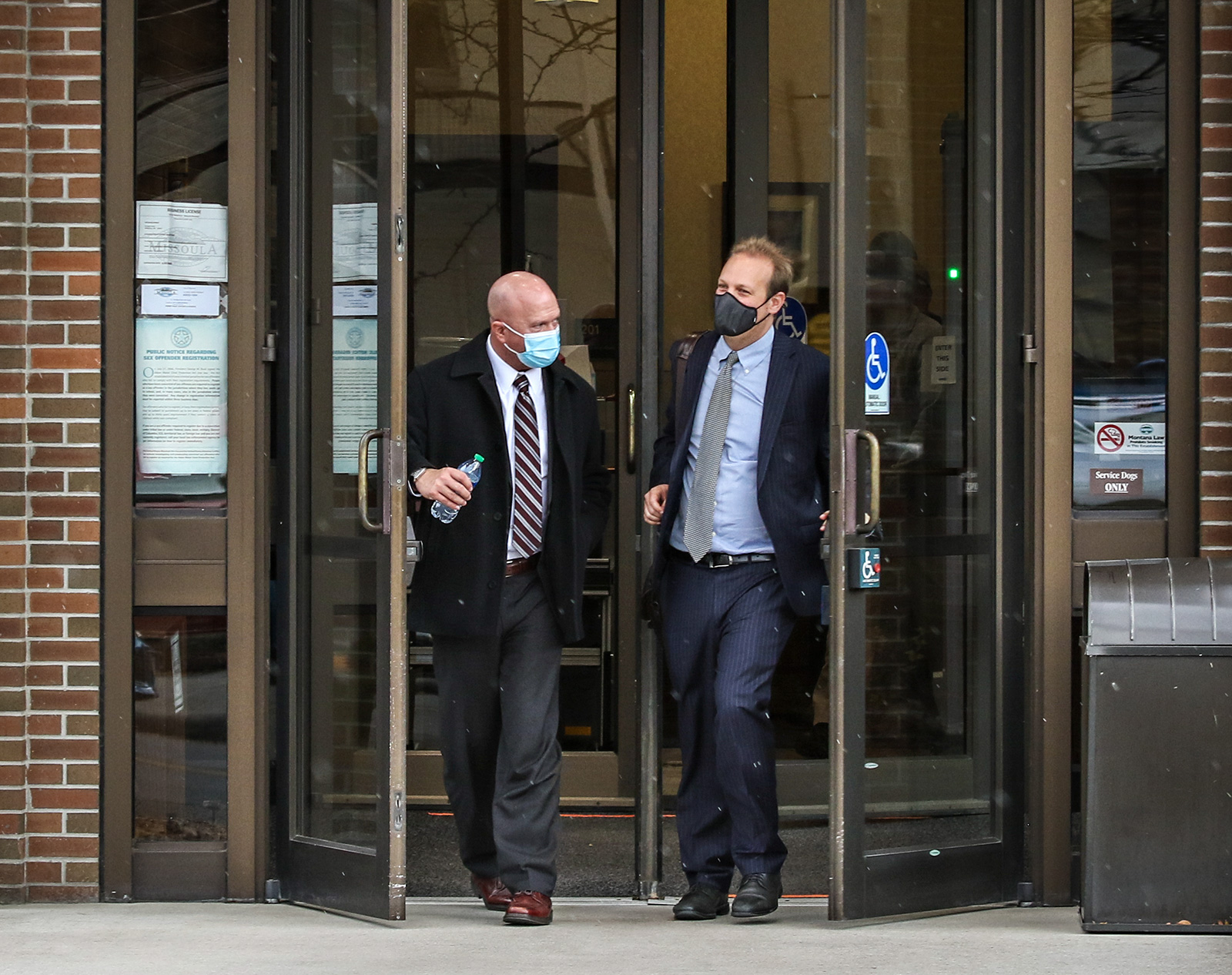Federal Judge Tosses Racketeering Claims Against Goguen
The lawsuit filed by Matthew Marshall, who is serving six years in federal prison for defrauding the wealthy Whitefish businessman, was dismissed with prejudice
By Tristan Scott
A federal judge this week dismissed a convicted conman’s outlandish civil claims against wealthy Whitefish businessman Michael Goguen for lacking merit, ending a years-long legal saga that pitted the local powerbroker against his former security chief turned business partner.
The civil lawsuit by Matthew A. Marshall, who is serving six years in a federal prison for his scheme to defraud Goguen of $2.35 million following a business partnership gone awry, alleged various violations of the Racketeer Influenced and Corrupt Organizations (RICO) Act.
According to the suit, which was filed under a federal statute designed to combat organized crime in the United States, Goguen used Marshall and the private defense company they founded together to cover up his extramarital relationships with women, raising his public profile and making it difficult for the company to secure high-value government contracts.
The debunked claims were built on shaky legal ground that grew less stable in July 2020, when prosecutors indicted Marshall on charges of wire fraud, money laundering and tax evasion for concocting an elaborate scheme to defraud Goguen out of millions of dollars by claiming to be a former CIA agent engaged in covert missions around the world.
As part of his criminal sentence, Marshall must pay restitution in the amount of $3,254,327, including the $2.35 million to Goguen as well as nearly $900,000 to the Internal Revenue Service (IRS) for tax evasion.
In a lengthy May 24 order and opinion in Marshall’s civil suit, U.S. District Judge Donald Molloy of Missoula put an end to the scurrilous claims, characterizing his effort to decipher the “236-page, 941-paragraph … verbose pleading” as “about as easy as completing a 10,000-piece jigsaw puzzle of a polar bear in a snowstorm.”
“Instead of providing a plausible ‘short and plain statement’ of the case and informing the defendants of exactly what they are alleged to have done to cause damage, Plaintiffs’ protracted pleading makes it almost impossible for the defendants and the Court to accurately understand, address and respond to each claim,” Molloy wrote. “The slow wade through this morass is exacerbated by the inherent complexity of civil RICO actions.”
Describing the lawsuit as a “torrent of accusatory factual allegations generally divorced from the specific requirements for a RICO action,” Molloy dismissed the claim with prejudice, meaning Marshallcannot rehash the claims.
In addition to Marshall, plaintiffs in the now-defunct case against Goguen include John Maguire, Anthony Aguilar and Keegan Bonnet, who between 2013 and 2018 were hired by Marshall to work for Amyntor Group, LLC, a company whose primary goal was to obtain high-paying private and governmental security contracts. With Goguen’s funding, Marshall and his co-plaintiffs built Amyntor into a flourishing business, expanding until it had offices in Montana, Virginia, Texas, Iraq, and Mexico City. At some point, Marshall says he became concerned about Amyntor’s association with Goguen and the impact his high-profile conduct would have on the company’s ability to obtain defense contracts.
As a result, Marshall and Maguire say they unsuccessfully attempted to buy Goguen’s interest in Amyntor in 2018; in response, Goguen “stormed out of the room and refused to continue the conversation.” Goguen dissolved Amyntor in the fall of 2018.
In addition to Goguen, co-defendants in the case include the businessman’s accountants and business partners, as well as a former Whitefish police detective who prosecutors say Marshall — colluding with the former police chief — set up on bribery charges in order to exact revenge on Goguen.
In addition to Marshall’s criminal convictions, his relationship with Goguen has had other ramifications in Whitefish, including a direct connection to former Whitefish Police Chief Bill Dial, who retired abruptly last August after leading the department for two decades. Shortly after Dial’s retirement, the state Justice Department’s watchdog bureau responsible for overseeing law enforcement training and certification in Montana, the Public Safety Officer Standards and Training Council (POST), leveled allegations of official misconduct against him.
Those allegations are supported by hundreds of text messages exchanged between Dial and Marshall that appear to show the men conspiring to tarnish Goguen’s reputation. The connection between Goguen, Marshall and Dial emerged when the former police chief filed a civil lawsuit against Goguen in December 2019. That lawsuit is still pending in Flathead County District Court, although Dial’s attorney has withdrawn from the case.
“He sidled up to the police chief in Whitefish, cultivating a friendship that he later used to his benefit whenever possible,” Assistant U.S. District Attorney Tim Racicot wrote of Marshall in a sentencing memorandum in the criminal proceedings.
According to Racicot, Marshall’s history of deception dates back decades, beginning when he lied to the Indiana State Police in a job application in 1996, failing to disclose he had resigned from another police department in Marion, Indiana after he was named as a suspect in a residential burglary there. He lied again in 1998, court documents state, when “he parlayed his fake military service into a coveted position on the state police Emergency Response Team,” resigning from the Indiana State Police when “his duplicity was discovered.”
To lend credence to Marshall’s false claims of military service and secure funding from Goguen, prosecutors say he got a tattoo of the U.S. Marine Corps “Force Recon” insignia and sent his unwitting victim prayer beads he claimed to have removed from a dead terrorist while leading an elite force to recover the body of Abu Musab Al-Zarqawi after a targeted strike in Iraq.